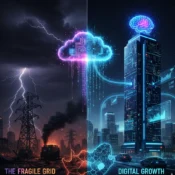
The Evolving Cloud Landscape
Beyond the Public Cloud: The Rise of Hybrid and Multi-Cloud Strategies
For years, the conversation around cloud adoption often revolved around a simple “lift and shift” to a public cloud provider like AWS, Azure, or Google Cloud. While public cloud remains a powerful force, many organizations have realized that a one-size-fits-all approach isn’t always the most effective.
- Hybrid Cloud: This approach combines public cloud resources with a private cloud (often on-premises or in a dedicated data centre). It allows businesses to keep sensitive data or mission-critical applications within their private infrastructure while leveraging the scalability and cost-effectiveness of the public cloud for less sensitive workloads. Imagine a local manufacturing plant in Industria leveraging the public cloud for their customer-facing website, while keeping their intellectual property and production control systems securely on a private cloud.
- Multi-Cloud: Taking it a step further, multi-cloud strategies involve using services from multiple public cloud providers. This can offer benefits like vendor lock-in avoidance, enhanced disaster recovery capabilities (if one cloud goes down, you have another), and the ability to choose the best-of-breed services from different providers for specific needs. Perhaps a financial institution in Sandton uses one cloud for its analytics due to superior AI/ML capabilities and another for its core banking applications due to regulatory compliance features.
The shift towards hybrid and multi-cloud is a clear indication that businesses are seeking more nuanced, tailored cloud environments that align with their specific operational and regulatory requirements.
Edge Computing: Bringing the Cloud Closer to the Action
As the volume of data generated at the “edge” – think IoT devices, smart sensors, and local processing units – continues to explode, traditional cloud models face challenges with latency and bandwidth. This is where edge computing steps in.
Edge computing brings data processing and analysis closer to the source of data generation, rather than sending it all the way to a centralized cloud data centre. This dramatically reduces latency, enabling real-time decision-making – critical for applications like autonomous vehicles, industrial automation, and smart city initiatives (which are slowly but surely taking root even in our local metros). For a mining operation in Rustenburg, processing sensor data at the mine site itself can provide immediate insights for safety and efficiency, without waiting for data to travel to a distant cloud.
The cloud and edge computing aren’t mutually exclusive; they’re complementary. The edge handles immediate processing, while the cloud provides centralized management, long-term storage, and deeper analytics.
Serverless Computing: Focus on Code, Not Infrastructure
Remember the days of provisioning servers, installing operating systems, and managing patches? Serverless computing (often referred to as Function-as-a-Service or FaaS) liberates developers from these infrastructure management tasks.
With serverless, you simply write your code (functions) and the cloud provider handles all the underlying infrastructure. You only pay for the compute resources consumed when your code actually runs, making it incredibly cost-effective for event-driven applications, APIs, and microservices. For a startup in Braamfontein developing a new mobile app, serverless allows them to rapidly iterate and scale without the overhead of managing dedicated servers. It’s a game-changer for agility and cost optimization.
Sustainable Cloud: Greener IT for a Greener Future
As businesses become more conscious of their environmental footprint, the concept of sustainable cloud computing is gaining significant traction. Cloud providers are investing heavily in renewable energy sources, energy-efficient data centre designs, and innovative cooling technologies.
For South African businesses, choosing a cloud provider with strong sustainability credentials isn’t just about corporate social responsibility; it can also lead to operational efficiencies and a reduced carbon footprint, aligning with global efforts to combat climate change. In a country facing energy challenges, understanding the energy consumption of your cloud infrastructure is becoming increasingly important.
The Rise of Industry Cloud Platforms (ICPs)
Beyond the horizontal cloud services that cater to all industries, we’re seeing the emergence of Industry Cloud Platforms (ICPs). These are tailored cloud solutions built for specific industry verticals, incorporating pre-built functionalities, compliance frameworks, and data models relevant to that industry.
Think of an ICP for healthcare that includes pre-configured modules for patient management, electronic health records, and regulatory compliance (like POPIA in South Africa). Or an ICP for financial services that integrates with core banking systems and adheres to stringent financial regulations. These platforms accelerate digital transformation for specific industries by providing ready-to-use, compliant solutions.
Staying Ahead in the Cloud Race
The cloud landscape is a dynamic and exciting space. For businesses in South Africa, keeping abreast of these evolving trends is crucial for maintaining a competitive edge, optimizing operations, and ensuring business resilience. Whether you’re exploring hybrid cloud strategies, embracing edge computing, or considering the move to serverless, strategic cloud adoption is key to navigating the future of technology.
At Innervest CC, we understand the complexities of the modern cloud environment. We partner with businesses across South Africa to design, implement, and manage cloud strategies that are not only efficient and secure but also future-proof. Contact us today to discuss how we can help you navigate the evolving cloud landscape and unlock its full potential for your business.




